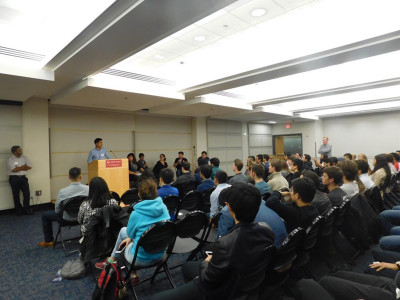
From blood, sweat and tears to the “best thing to ever happen,” four startup founders divulged the often-veiled hardships that come with fledgling companies, all the while boasting about the triumphs that reinforce them at Tuesday night’s “Intro to Boston Startups and Tech for Undergrads.”
“Startups totally suck,” said panel member Greg Gomer, who co-founded VENTUREAPP and other startups, through with a wide smile. “You are not going to make any money.”
Tom O’Keefe, widely known as the man behind @BostonTweet, proved Gomer’s point no better than when he reminisced on making “maybe $10,000 my first year” working on startups.
It was these un-romanticized truths that students yearned for at Boston University’s Photonics Center. While a large portion of the attendees were BU students, nearly half came from seven other local universities, including Boston College, Harvard University and Northeastern University.
The program, co-sponsored by the BU Entrepreneurship Club and Boston Undergrad Innovators, was the first combined effort between the groups and was designed to give students an understanding of launching and running a startup. The question-and-answer session was moderated by Trish Fontanilla, a mentor at Technovation Challenge, a group for women in science, technology, mathematics and engineering fields.
Fontanilla spoke with members of what she called a “world-premier panel,” made up of O’Keefe, who is also the founder of Flutter; Kate Weiler, co-founder of DRINKmaple; Aman Advani, co-founder of Ministry of Supply; and Gomer.
Though the panel members were quick to point out the negatives of launching a business, they just as quickly pointed out the positives.
“I know I said startups suck like 10 minutes ago,” Gomer said, “but startups are the best thing to ever happen to any one of us. I wouldn’t trade it for the world. The people that I’ve met, the experience that I’ve had, both good and bad.”
“The community’s been extremely supportive,” Weiler said as she pointed out “the excitement of really getting those people in the same position to grow it.”
Topics ranged from the rigorous beginning of a startup to the persistence one needs to get their idea up and running.
“The immense number of noes isn’t necessarily an indication that you’re on the wrong track,” Advani said.
Several students in attendance said they were there to broaden their network through peers while others said they were looking to expand what they knew about the city’s startup culture.
“I’m here to hear the ideas and meet other grad students,” said Khulan Zen, a student from Mongolia now in her second year at Harvard. Zen, who also works at Tomujin, a Mongolian education initiative to help high school students receive academic counseling and learn more about schools in the United States, said she also hoped to learn more about what young students care about.
Leah Rogoff, a senior at BC, said she was “interested in learning more about the Boston startup scene.”
“There [are] not very many resources currently for students to get jobs at startups. There’s not exactly as direct of an outlet for smaller companies,” she said, comparing larger companies’ recruiting processes to those of startups.
Rogoff also said that walking away with an understanding of the persistency needed to run a startup would benefit her down the road.
“It’s one thing to want something and be passionate about something, but if you’re not going to have the gusto … to go after it,” she said, “”it’s not really going to be beneficial in the long run.”
O’Keefe gave similar advice in his departing words to the crowd.
“If you want to do it,” he said, “do it.”
Correction: Due to an editing error, a previous version stated that Tom O’Keefe made $10,000 in his first year while working at Flutter, when he actually made the money working on other startups. This correction is reflected in the story.


























































































































